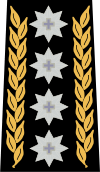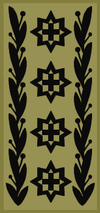General (Switzerland)
| General German: General French: Général Italian: Generale Romansh: Generale | |
|---|---|
 Dress uniform shoulder strap with the rank of General | |
 Battledress rank insignia of General. | |
 Kepi of General. | |
| Country |
|
| Service branch |
|
| Abbreviation | German: GEN |
| Rank | Four-star |
| NATO rank | OF-9 |
| Formation |
1512 as Old Swiss Confederacy 1849 as Switzerland |
| Next higher rank | None |
| Next lower rank |
English: Lieutenant general, German: Korpskommandant, French: Commandant de corps, Italian: Comandante di corpo, Romansh: Cumandant da corp |
The General (German: Der General, French: le général, Italian: il generale, Romansh: il general) is an office and rank in the armed forces of Switzerland. It is held by the commander-in-chief of the Army in time of war only. Under the Swiss Constitution, he must be elected by the Federal Assembly, assembled as the United Federal Assembly, specifically for the purpose of taking on the war-time responsibilities.
Role
Normally the word "general" is not used in the Swiss military, with three-star commandants de corps the highest-ranking officers in the army.[1] Under the Constitution, the Federal Council, which acts as the country's head of state, can command only 4,000 soldiers, with a time limit of three weeks of mobilisation. For it to field more service personnel, the Federal Assembly must elect a General[2] who is given four stars.[1] Thus, the General is elected by the Federal Assembly to give him the same democratic legitimacy as the Federal Council.[2]
The general is elected by a joint session of the Federal Assembly, known as the United Federal Assembly, wherein both the 200-seat National Council and 46-seat Council of States join together on a 'one member, one vote' basis. The Federal Assembly retains the sole power to dismiss the General, but the General remains subordinate to the Federal Council by the Council's ability to demobilise and hence making the position of General redundant.[2]
History
Generals were appointed during the Baden Revolution, the Neuchâtel Crisis, the Franco-Austrian War, the Franco-Prussian War, the First World War and the Second World War, although Switzerland was militarily involved in none of them and the role of the army in these times was mainly to guard the border.
All senior officers used to hold variations on the rank of Colonel (there were "Brigade Colonels", for instance). Nowadays, the general officer ranks are: Brigadier, Divisionär (Major General), Korpskommandant (Lieutenant General) and General (which is not currently used). The senior Swiss officer detached to the line of demarcation in Panmunjeom, South Korea, however, is given the courtesy designation of Generalmajor (Major General) for equality purposes.[3]
List of generals
The following Swiss officers have held the rank of General as the leaders of the Army in time of war:
| Name | Election | War |
|---|---|---|
| Guillaume Henri Dufour [4] | 21 October 1847[lower-alpha 1] | Sonderbund War |
| August 1849 | Baden Revolution | |
| 27 December 1856 | Neuchâtel Crisis | |
| 1859 | Franco-Austrian War | |
| Hans Herzog | 19 July 1870 | Franco-Prussian War |
| Ulrich Wille | 8 August 1914 | First World War |
| Henri Guisan | 30 August 1939 | Second World War |
Notes
- ↑ Prior to the establishment of Switzerland as a federal state
References
- 1 2 McPhee, John (1983-10-31). "La Place de la Concorde Suisse-I". The New Yorker. p. 50. Retrieved 22 July 2013.
- 1 2 3 Haltiner, Karl W. (2002). "The Swiss Security Sector: Structure, Control, Reforms" (PDF). Geneva Centre for the Democratic Control of Armed Forces.
- ↑ "Die Schweiz seit 60 Jahren im koreanischen Niemandsland" [Switzerland for 60 years at the korean No man's land]. srf.ch (in German). 2013-07-27. Retrieved 2018-03-17.
Für den in Panmunjom stationierten Delegationschef des NNSC, Generalmajor Urs Gerber, ...
- ↑ Langendorf, Jean-Jacques (7 November 2005). "Dufour, Guillaume-Henri" (in German). Historical Dictionary of Switzerland. Retrieved 16 January 2017.